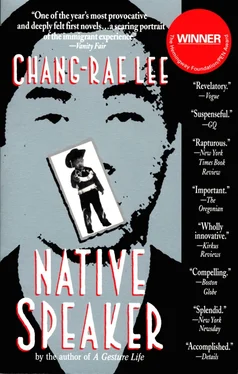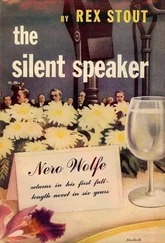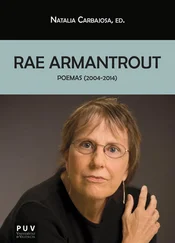Chang-Rae Lee
Native Speaker
For my mother and my father
I turn but do not extricate myself,
Confused, a past-reading, another,
but with darkness yet.
— Walt Whitman
The day my wife left she gave me a list of who I was.
I didn’t know what she was handing me. She had been compiling it without my knowledge for the last year or so we were together. Eventually I would understand that she didn’t mean the list as exhaustive, something complete, in any way the sum of my character or nature. Lelia was the last person who would attempt anything even vaguely encyclopedic.
But then maybe she herself didn’t know what she was doing. She was drawing up idioms in the list, visions of me in the whitest raw light, instant snapshots of the difficult truths native to our time together.
The year before she left she often took trips. Mostly weekends somewhere. I stayed home. I never voiced any displeasure at this. I made sure to know where she was going, who’d likely be there, the particular milieu , whether dancing or a sauna might be involved, those kinds of angles. The destinations were harmless, really, like the farming cooperative upstate, where her college roommate made soft cheeses for the city street markets. Or she went to New Hampshire, to see her mother, who’d been more or less depressed and homebound for the last three years. Once or twice she went to Montreal, which worried me a little, because whenever she called to say she was fine I would hear the sound of French in the background, all breezy and guttural. She would fly westward on longer trips, to El Paso and the like, where we first met ten years ago. Then at last and every day, from our Manhattan apartment, she would take day trips to any part of New York City, which she loved and thought she would never leave.
One day Lelia came home from work and said she was burning out. She said she desperately needed time off. She worked as a speech therapist for children, mostly freelancing in the public schools and then part-time at a speech and hearing clinic downtown.
Sometimes she would have kids over at our place. The children she saw had all kinds of articulation problems, some because of physiological defects like cleft palates or tied tongues. Others had had laryngectomies, or else defective hearing, or learning disabilities, or for an unknown reason had begun speaking much later than was normal. And then others — the ones I always paid close attention to — came to her because they had entered the first grade speaking a home language other than English. They were nonnative speakers. All day she helped these children manipulate their tongues and their lips and their exhaling breath, guiding them through the difficult language.
So I told her fine, she could take it easy with work, that I could handle the finances, we were solid that way. This is when she professed a desire to travel — she hadn’t yet said alone —and then in the next breath admitted she’d told the school people not to call for a while. She said she felt like maybe writing again, getting back to her essays and poems. She had published a few pieces in small, serious literary magazines early in our marriage, written some book reviews, articles, but nothing, she said harshly, that wasn’t half-embarrassing.
She handed the list to me at the Alitalia counter at Kennedy, before her flight to Rome and then on to Naples and, finally, Sicily and Corsica. This was the way she had worked it out. Her intention was to spend November and December shuttling between the Italian islands, in some off-season rental, completely alone.
She was traveling heavy. This wasn’t a trip of escape, in that normal sense. She was taking with her what seemed to be hundreds of books and notepapers. Also pads, brushes, tiny pastel-tinted sponges. Too many hats, I thought, which she wore like some dead and famed flyer. A signal white scarf of silk.
Nothing I had given her.
And maps. Here was a woman of maps. She had dozens of them, in various scales. Topographic, touristical, some schematic — these last handmade. Through the nights she stood like a field general over the kitchen counter, hands perched on those jutting hip bones, smoking with agitation, assessing points of entry and encampment and escape. Her routes, stenciled in thick deep blue, embarked inward, toward an uncharted grave center. A messy bruise of ink. She had already marked out a score of crosses that seemed to say You Are Here . Then, there were indications she was misreading the actual size of the islands. Her lines would have her trek the same patches of rocky earth many times over. Overrunning the land. I thought I could see her kicking at the bleached, known stones; the hard southern light surrendering to her boyish straightness; those clear green eyes, leveling on the rim of the arched sea.
Inside the international terminal I couldn’t help her. She took to bearing the heaviest of her bags. But at some point I panicked and embraced her clumsily.
“Maybe I’ll come with you this time,” I said.
She tried to smile.
“You’re just trading islands,” I said, unhelpful as usual.
I asked if she had enough money. She said her savings would take care of her. I thought they were our savings, but the notion didn’t seem to matter at the moment. Her answer was also, of course, a means of renunciation, itself a denial of everything else I wasn’t offering.
When they started the call for boarding she gave me the list, squeezing it tight between our hands.
“This doesn’t mean what you’ll think,” she said, getting up.
“That’s okay.”
“You don’t even know what it is.”
“It doesn’t matter.”
She bit her lip. In a steely voice she told me to read it when I got back to the car. I put it away. I walked with her to the entrance. Her cheek stiffened when I leaned to kiss her. She walked backward for several steps, her movement inertial, tipsy, and then disappeared down the telescoping tunnel.
I read through the list twice sitting in our car in the terminal garage. Later I would make three photocopies, one to reside permanently next to my body, in my wallet, as a kind of personal asterisk, I thought, in case of accidental death. Another I saved to show her again sometime, if I wanted pity or else needed some easy ammunition. The last, to historicize, I sealed in an envelope and mailed to myself.
The original I destroyed. I prefer versions of things, copies that aren’t so precious. I remember its hand, definitely Lelia’s, considerable, vertical, architectural, but gone awry in parts, scrawling and windbent, in unschemed colors of ink and graphite and Crayola. I could tell the page had been crumpled up and flattened out. Folded and unfolded. It looked weathered, beaten about her purse and pockets. There were smudges of olive oil. Maybe chocolate. I imagined her scribbling something down in the middle of a recipe.
My first impression was that it was a love poem. An amnesty. Dulcet verse.
But I was wrong. It said, variously:
You are surreptitious
B+ student of life
first thing hummer of Wagner and Strauss
illegal alien
emotional alien
genre bug
Yellow peril: neo-American
great in bed
overrated
poppa’s boy
sentimentalist
anti-romantic
— analyst (you fill in)
stranger
follower
traitor
spy
For a long time I was able to resist the idea of considering the list as a cheap parting shot, a last-ditch lob between our spoiling trenches. I took it instead as one long message, broken into parts, terse communiqués from her moments of despair. For this reason, I never considered the thing mean. In fact, I even appreciated its count, the clean cadence. And just as I was nearly ready to forget the whole idea of it, maybe even forgive it completely, like the Christ that my mother and father always wished I would know, I found a scrap of paper beneath our bed while I was cleaning. Her signature, again: False speaker of language .
Читать дальше












